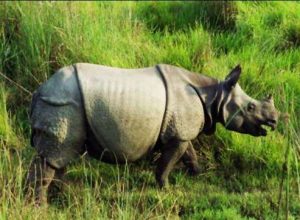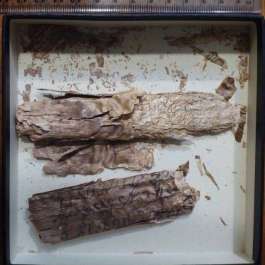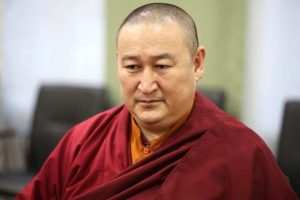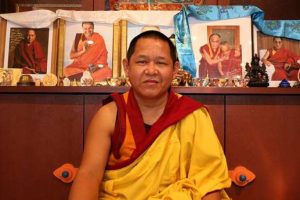The Korean Seon (Zen) master Venerable Pomnyun Sunim (법륜스님) wears many hats: Buddhist monk, teacher, author, environmentalist, social activist, and podcaster, to name a few. As a widely respected Dharma teacher and a tireless socially engaged activist in his native South Korea, Ven. Pomnyun Sunim has founded numerous Dharma-based organizations, initiatives, and projects that are active across the world. Among them, Jungto Society, a volunteer-based community founded on the Buddhist teachings and expressing equality, simple living, and sustainability, is dedicated to addressing modern social issues that lead to suffering, including environmental degradation, poverty, and conflict.
The following article shared by Jungto Society is part of a series of notable highlights from Ven. Pomnyun Sunim’s writings, teachings, and regular live-streamed Dharma Q+A sessions, which are accessible across the globe.
When the Buddha was close to death, his disciples came to him and asked:
“How would you like us to conduct your funeral?”
The Buddha answered:
“You don’t need to worry about my funeral because the lay Buddhists will take care of it.”
Lay Buddhists are those who take refuge in the Three Jewels and practice the Five Precepts without becoming monks or nuns. When the Buddha said that they would take care of it, he meant that his funeral would be conducted based on the customs of laypeople in India. And so, after the Buddha died, lay Buddhists cremated the Buddha’s body according to Indian tradition. If he had lived in Korea, the Buddha would have been buried in the ground as is the custom in Korea.
The Dharma is a teaching about truth, so it does not contain cultural aspects. However, since Buddhism originated in India, the local traditions, customs, and culture were integrated into Buddhist culture. Strictly speaking, neither cremation nor the 49-day posthumous ceremony is a fundamental tradition of Buddhism. They are, in fact, part of the of Indian cultural tradition.
It is said that the deceased person has 49 days to be saved and they are classified into one of nine levels based on their deeds during their life:
“Anyone can be reborn in paradise after he dies if he sincerely hopes for it. However, not everyone can be reborn in paradise right away since people fall into one of the nine categories based on their deeds.”
Specifically, people are divided into three categories of high, middle, and low, and those in each of the three categories are again divided into high, middle, and low. And so there are a total of nine categories.
It is believed that people in the very highest category are reborn in paradise immediately after their death. It is comparable to leaving one room and entering another room. Those in the second category are reborn within 12 hours. It takes a day for those in the third category, three days for those in the fourth, a week for those in the fifth, 21 days for those in the sixth, and finally, it takes 49 days for those in the seventh category to be reborn in paradise. This is the reason that people hold the 49-day posthumous ceremony. This ritual provides an opportunity for people to do good deeds on behalf of deceased family members and help them to be reborn in paradise within 49 days.
What happens to the people in the eighth and ninth categories? Ultimately, people in all nine categories will all be reborn in paradise. However, those in the eighth and ninth categories have to spend some time in hell before doing so. Each year, Buddhists perform the Buddhist All Soul’s Day ceremony in the seventh month of the lunar calendar to save the souls of those in the two lowest categories from hell. There is no point in debating whether or not this is true because it is a religious belief. As such, people are free to choose whether or not to believe it.
Funeral customs vary greatly from religion to religion and country to country. In India, the dead are usually cremated. In Tibet, the dead are left to be eaten by birds. The corpse is cut up on big rocks high in the mountains, where it is consumed by vultures and birds of prey. In desert regions, the dead are “buried in the wind.” That is, they are nailed to a wooden board and exposed to the elements for a year until only the bones remain, after which a funeral ceremony is performed. In regions with many islands, the dead are dropped into the sea.
Each of these funeral rituals has its unique meaning and significance. Tibetans feed their dead to birds because they believe that the spirit of the dead will fly to heaven with the birds. Some cultures bury the dead in the ground because of the belief that the spiritual world exists underground. Meanwhile, Indians believe in reincarnation, so they cremate the corpse to help the spirits quickly sever their attachments to their worldly bodies in order to be reborn.
Regardless of the funeral ritual performed, once a person dies it’s the end. By saying “the end” I am not implying that there is no heaven or afterlife; I am simply saying that the person who draws his last breath no longer exists in this world. From a Christian viewpoint, their spirit goes to heaven. From a Buddhist perspective, their spirit is reborn. So there is nothing more we can do for them.
Therefore, the best farewell for those who pass away is to let them go from our hearts.
See more
Pomnyun
Jungto Society
JTS Korea
JTS America
International Network of Engaged Buddhists
Related videos from BDG
Dharma Q+A with Ven. Pomnyun Sunim
Wisdom Notes from Ven. Pomnyun Sunim
Related features from BDG
Ven. Pomnyun Sunim: Buddhism in a Divided World
The Hungry Should Eat: JTS Brings Buddhist Compassion and Relief to India
Engaged Buddhism: Seon Master Pomnyun Sunim Pledges 10,000 Tons of Food Aid for Children in North Korea
Engaging with Suffering, Realizing Freedom: An Interview with Ven. Pomnyun Sunim
Related news reports from BDG
Engaged Buddhism: 20th Biennial INEB Conference Commences in South Korea
Engaged Buddhism: Ven. Pomnyun Sunim and JTS Volunteers Visit Sujata Academy Project in India
Engaged Buddhism: Ven. Pomnyun Sunim and JTS Volunteers Bring 100,000 Gas Stoves to Rohingya Refugees in Bangladesh
Engaged Buddhism: Ven. Pomnyun Sunim Shares the Fruits of Compassion to Mark the Birth of the Buddha
Engaged Buddhism: Ven. Pomnyun Sunim Delivers Compassion to the Vulnerable in Korea
Engaged Buddhism: Jungto Society Delivers Compassion for the Vulnerable in Korea
Engaged Buddhism: JTS Korea Distributes Emergency Flood Relief in Cambodia
Engaged Buddhism: JTS Korea Donates COVID-19 Relief Supplies to Myanmar in Cooperation with INEB and KMF
Engaged Buddhism: Jungto Society Sharing the Gift of Compassion this Winter
UPDATE: Buddhist Relief from JTS Korea Transforming the Lives of Rohingya Refugees
Engaged Buddhism: JTS Korea Brings Warmth to Vulnerable Communities amid Winter Freeze















Myanmar government should be kind to Rohingya as Bangladesh government has shown humanity towards them becose they are mayanmar citizen.
Citizens of any country do not want their own country’s tourist destinations to be ruined. If it is for the citizens of another country, it is not acceptable in any way. At the moment there is nothing to do without the help of human rights organizations.